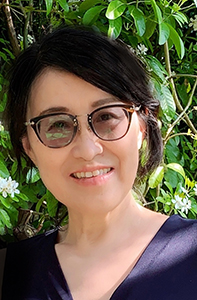 Lead Engineer, Structural Integrity Sector, EDF Energy
Lead Engineer, Structural Integrity Sector, EDF Energy
Joy is a Chartered Engineer and Fellow of the Institution of Mechanical Engineers. She has over 30 years structural integrity experience in the academic, aerospace, nuclear, and petrochemical industries.
Joy’s first degree is in mechanic engineering from Zhejiang University, China and her PhD degree is in civil engineering from the University of Glasgow.
Her academic experience stems from her work at Imperial College London as a Post Doctorial Research Associate in 2000, being responsible for development of a new composite finite element model, new non-linear material models and an elevated temperature model for composite structure.
To meet her satisfaction of solving day to day engineering problems, Joy then moved to Honeywell Aerospace, Yeovil as a Senior Staff Engineer in 2002. During this time, she performed lots of static, dynamic analyses for various military aircrafts.
In 2006, she joined Messier-Dowty Limited (currently Safran Landing Systems) as an Assistant Principal Engineer, and became Principal Engineer and Lead Stress one year later. Leading the Stress Analysis Team of the A400M military transporter Nose Landing Gear (NLG) IPT, she managed to deliver the structural analyses and made key decisions on structural related issues to meet programme deliverables and ensure quality & efficiency. After the successful A400M’s first flight, her responsibility was moved to the preliminary structural stress assessment of the A350-1000 aircraft’s Main Landing Gear (MLG) for the company’s commercial bidding.
After being inspired by the new challenge of nuclear power technology, she moved to EDF Energy in 2010. She soon became a Suitably Qualified Experienced Personnel in many key structural analysis areas, such as classic strength and material, design codes, fatigue, low temperature fracture (R6), high temperature creep (R5), creep rupture and complex finite element analysis. As a Lead Engineer, she is responsible for team deliveries, balancing emerging work against planned activities, and managing the internal and external resources to meet the satisfaction of the stakeholders.
Besides the UK experiences, she also has many years’ experience in China, worked with a leading General Machinery Research Institute (GMRI) as a Senior Research Engineer, engaged in the design, research and testing of pressure vessel & pipe, and the development of design code and fracture assessment methods.